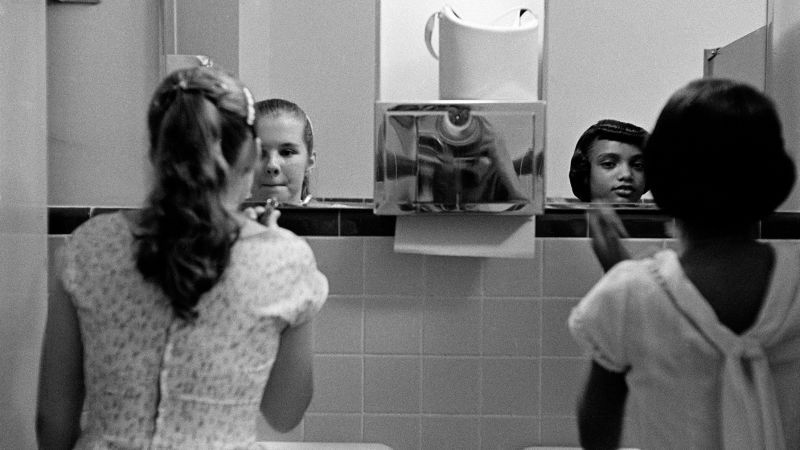Petworth, UK
CNN
—
When Eve Arnold joined Magnum in 1951 – four years after the renowned photographic agency was founded – she was its first female photographer. “Magnum was about to open a New York office,” she would write in her acclaimed monograph, 1976’s ‘The Unretouched Woman’. “I went to see them. Being a woman helped. I was to be their token American woman stringer.” By 1957, when she became a full member, she was one of just two women on the agency’s books internationally.
Seventy years later, a new exhibition delves into Eve Arnold’s extensive archive, foregrounding a collection of her most significant work. “The subject matter is definitely not just women, but it is her perspective that we wanted to reflect,” said Nicola Jones, founder and director of the Newlands House Gallery in Britain, in an interview with CNN.

The photographer’s most celebrated images are presented alongside several of her lesser known but equally compelling works: from Marilyn Monroe on the set of “The Misfits” to Malcolm X speaking in Washington, and Black fashion shows in Harlem to a natal ward in Long Island.
“One thing that comes through in all of her photographs is a non-judgmental, empathetic character,” continued Jones. “The breadth of her work too, was so extraordinary, as was how quietly and effectively she overcame various taboos, and similarly the access she managed to obtain.”
Born in Philadelphia to Jewish immigrant parents from Ukraine, aged 31 Eve moved to New York where she married, eventually settling in the UK in the 1960s where she lived until her death, at age 99 in 2012. While in New York she took a photography class under Alexey Brodovitch — the-then art director of Harper’s Bazaar — at the New School for Social Research.

Tasked with a “fashion” assignment, Eve spent a year photographing weekly catwalk shows in Harlem, a largely invisible (within the mainstream fashion industry) series of events featuring Black models showing off homemade outfits to a Black crowd. “The photos were fantastic and really ground-breaking,” said Jones. “She chose to do something so incredibly different at a time when segregation was still so prevalent in America.”
“The issues she photographed are as important (now), if not more so, than ever before,” Michael Arnold, the photographer’s grandson, told CNN in an interview. “She kept herself neutral because she saw her job as a reporter. She was fascinated in what was going on in the world around her and wanted to shine a light on it. Despite being apolitical, her subjects (revealed) her interests.”
Elsewhere on display is a lone image from a series shot to accompany a piece in The Sunday Times Magazine: “Lesbian wedding celebration” highlights the heterogeneity of Eve’s camera. “The original piece, interestingly, was called ‘Women Without Men’ — as if that’s such a groundbreaking thing — but in 1965 it was something you could make a reportage story out of,” said Michael. “When Eve started out doing photography, 95% of women were housewives. For her to go out and be traveling the world was groundbreaking.”

Indeed, she acknowledged the anomaly and supposed eccentricity of her gender in “The Unretouched Woman”. “My colleagues were not spoken of in inverted commas; they were not ‘career men’ or ‘men photographers’,” she wrote, recognizing the double standard while never establishing herself as a feminist.
Her gender however, while in no way shaping her photographic successes, would, by default, inform her legacy at the vanguard of twentieth century photography, something she frequently downplayed said Michael. “It wasn’t false modesty, she genuinely found it quite strange,” he recalled. “She perhaps didn’t even recognize the role that she played in the history of photography.”
While Eve once told Michael she didn’t want to be known just for her Marilyn Monroe work, the images are a striking example of her broader practice and ability to build authentic relationships with her subjects. “Those shots, globally known now, tell a story of a lady who managed to gain the trust of someone who was notoriously vulnerable and at times fragile, who trusted Eve to photograph her in ways that perhaps she wouldn’t allow others to,” said Jones.
Moreover, what allowed Eve ultimately to produce work as she did, was her bold sense of curiosity. “That drove her, a genuine, insatiable kind of curiosity. She wanted to know what made someone tick,” said Michael. “I think her compassion and curiosity is one of the major things that sets her apart. It’s the kind of humanity that shines through, whether she’s photographing the royal family or a working-class family. That’s what makes her photography relatable, and timeless.”
“Eve Arnold — To Know About Women” is on at the Newlands House Gallery in Petworth, UK, until January 7 2024.

